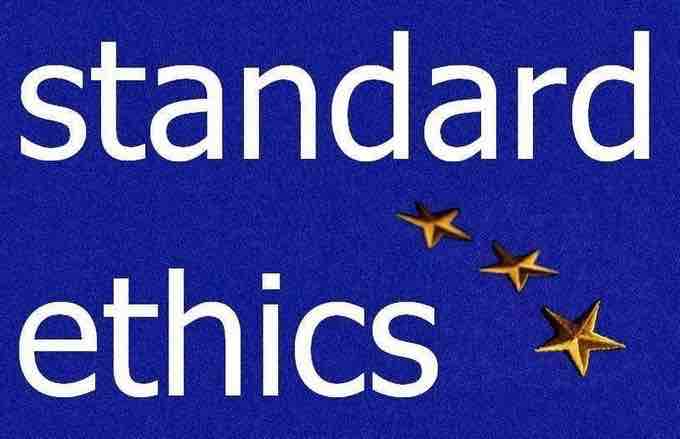Business ethics (also known as corporate ethics) is a form of applied ethics or professional ethics that examines ethical principles and moral or ethical problems that arise in a business environment. It applies to all aspects of business conduct and is relevant to the conduct of individuals and entire organizations.

Standard Ethics Logo
Standard ethics
Business ethics reflects the philosophy of business, one of whose aims is to determine the fundamental purposes of a company. If a company's purpose is to maximize shareholder returns, then sacrificing profits to other concerns is a violation of its fiduciary responsibility. Corporate entities are legally considered to be persons in the U.S. and in most nations. The "corporate persons" are legally entitled to the rights and liabilities due to citizens as persons.
Ethical issues include the rights and duties between a company and its employees, suppliers, customers and neighbors, and the company's fiduciary responsibility to its shareholders. Issues concerning relations between different companies include hostile take-overs and industrial espionage. Related issues include corporate governance, corporate social entrepreneurship, political contributions, legal issues (such as the ethical debate over introducing a crime of corporate manslaughter) and the marketing of corporations' ethics policies.
Business Ethics In Production
Business ethics in production usually deals with the duties of a company to ensure that products and production processes do not needlessly cause harm. In some cases consumers demand products that harm them, such as tobacco products. Production may have environmental impacts, including pollution, habitat destruction and urban sprawl. The downstream effects of nuclear technology, genetically modified food and mobile phones may not be well understood. While the precautionary principle may prohibit introducing new technology whose consequences are not fully understood, that principle would have prohibited most new technology introduced since the industrial revolution.
Labor Ethics
Human resource management occupies the sphere of activity of recruitment selection, orientation, performance appraisal, training and development, industrial relations and health and safety issues. Business ethicists differ in their orientation towards labor ethics. Some assess human resource policies according to whether they support an egalitarian workplace and the dignity of labor. Human resource management aims to deter discrimination by age (preferring the young or the old), gender/sexual harassment, race, religion, disability, weight and attractiveness.
Government Regulation
At times, the Federal government has been called upon to enact legislation meant to encourage more ethical business behavior. For example, in response to a number of major corporate and accounting scandals -- including those affecting Enron, Tyco International, Adelphia, Peregrine Systems and WorldCom -- the Sarbanes-Oxley Act (SOX) of 2002 was put into place. SOX -- also known as the "Public Company Accounting Reform and Investor Protection Act" in the Senate and "Corporate and Auditing Accountability and Responsibility Act" in the House -- is a United States Federal law that set new or enhanced standards for all U.S. public company boards, management and public accounting firms.
The act contains 11 titles, or sections, ranging from additional corporate board responsibilities to criminal penalties, and requires the Securities and Exchange Commission (SEC) to implement rulings on requirements to comply with the law. As a result of SOX, top management must now individually certify the accuracy of financial information. In addition, penalties for fraudulent financial activity are much more severe. Also, SOX increased the independence of the outside auditors who review the accuracy of corporate financial statements and increased the oversight role of boards of directors.
While it may seem scandals involving a lack of business ethics are a recent development, the Securities Acts of 1933 and 1934 were both put in place after the stock market crash in 1929. These are sweeping pieces of legislation that govern the secondary trading of securities (stocks, bonds, and debentures). The Acts and related statutes form the basis of regulation of the financial markets and their participants in the United States. The 1934 Act also established the SEC.